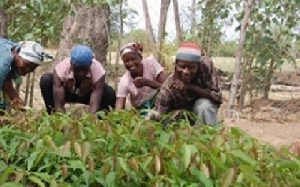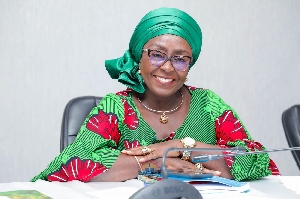Farmers in the Upper East Region have urged the government to put in continuous concerted agricultural policy reforms that will address challenges in the sector.
Reverend John Akaribo, Chairman of the Bolgatanga Municipal Branch of the Peasant Farmers Association of Ghana (PFAG) made the call when the Ghana News Agency sampled views from some farmers in the Upper East Region on the ongoing registration of farmers for Phase Two of the government special initiatives on planting for food and Jobs (PFJs).
He said there was a need for a deliberate policy on agriculture that would help track the performance of food and livestock production, eliminate the perennial bottlenecks that characterized the distribution of inputs and sustain food security in the country.
Reverend Akaribo said though Phase Two was expected to be continuity over the first phase there should be plans to sustain the improvements brought on board that suggested improvement in mechanization services and input supply devoid of smuggling.
However, he noted that the system of mapping the farmers before the start of phase two was likely to leave lots of farmers unregistered since the only two extension officers allocated to a district to register was putting a toll on them and making the process too slow considering the huge number of farmers involved in the areas.
Though he had not yet gone to register yet, the Reverend said awareness of the PFJs II programme was poor and required sensitization of people in the region.
“As we draw close to the rainy season, how does only two extension officers handle registration of all farmers in each extension area” he asked, and wondered why the Association was not involved to assist in the exercise in the region.
Mr Akaribo however, urged the government to put in strategies also on how the off-take of produce from farmers will be in order not to create marketing problems as farmers experienced with rice glut that still left the farmer to suffer to find buyers for the produce.
Mr Issac Pabia, a farmer and Executive Member of PFAG said the progress was too slow “One Agricultural Extension Officer (AEA) would have to move from one place to the other to register a farmer and because of that their movement is hampered because of lack of resources,” he said.
According to him, the farmer to an extension officer ratio is high and covering an extension area is slow and requires fast-tracking the process is important.
On the side of the input supply, Mr Pabia said “We are aware that government will work through aggregators and until the registration is over, for the aggregators to know the quantity of input to be requested as there is no data to use.
Mr Richard Akuka, Marketing manager for rice in Fumbisi in the Bulsa South district and member of the Innovation platform in Navrongo in the Kasena Nankana municipality who spoke on the registration of farmers indicated that Navrongo alone had a membership of over seven thousand farmers.
Phase two is expected to be conducted across all 16 regions and 261 districts in Ghana and to participate in phase two farmers or producers must meet specific requirements including having access to land or a farm.
Business News of Thursday, 23 May 2024
Source: GNA

















